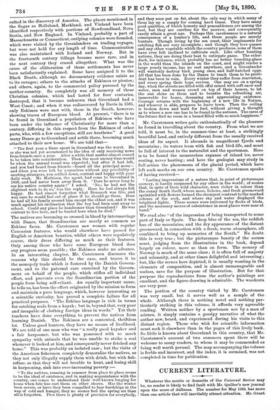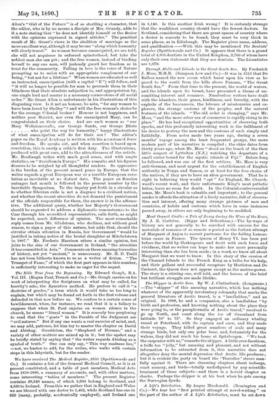CURRENT LITERATURE.
Whatever the merits or demerits of the Universe/ Review may be, no reader is likely to find fault with Mr. Quilter's new journal upon the score of dullness. The number for May 15th has more than one article that will inevitably attract attention. Mr. Grant
Allen's "Girl of the Future" is of so startling a character, that the editor, who is by no means a disciple of Mrs. Grundy, adds to it a note stating that "he does not identify himself or the Review with the opinions expressed in signed articles." The practical result of Mr. Grant's views is the abolition of marriage as the more excellent way, although it may be one "along which humanity will slowly travel." As woman becomes emancipated, we are told, she will not acquiesce in enforced spinsterhood, but take the noblest man she can get ; and the free woman, instead of binding herself to any one man, will jealously guard her freedom as in trust for the community. Falling in love is the voice of Nature prompting us to union with an appropriate complement of our being, "but not for a lifetime." When women are educated as well as instructed, emancipation (with a capital "B") will follow, and "it will no longer be possible for man to persuade them in their blindness that their absolute subjection to, and appropriation by, one single lord and master is a necessary corner-stone of all social order." Mr. Grant Allen is unfortunate in his illustrations of this disgusting view. Is it not an honour, he asks, "for any woman to have been loved by Shelley" ? and will the free woman's choice be for the average Colonial broker ? Honour is not happiness, and neither poor Harriet, nor even the emancipated Mary, can be congratulated on their choice. And are such women as "our Mary Wollstonecrafts, our George Sands, our George Blots
who point the way for humanity," happy illustrations of what emancipation will do for their sex ? The editor's paper on the Rval Academy is written with his accustomed force and freedom. He speaks out, and when assertion is based upon conviction, this is surely a critic's first duty. The illustrations, produced with great care, add to the attractiveness of the article. Mr. Bradlaugh writes with much good sense, and with ample statistics, on" Socialism in Europe." His remarks and his figures deserve to be weighed by all thoughtful readers. So oppressive is the burden of the present armed peace in Europe, that the writer regards a great European war or a terrible European revo- lution as inevitable at no distant date. The paper on Russian outrages last month is followed in the present number by the inevitable Symposium. To the inquiry put forth in a circular as to whether Siberian exile is not a disgrace to a civilised nation, and whether the recent atrocities do not demand the punishment of the officials responsible for them, the answer is in the affirma- tive. The additional query, whether her Majesty's Government should be requested to address a diplomatic remonstrance to the Czar through his accredited representative, calls forth, as might be expected, much difference of opinion. The most remarkable reply comes from Mr. Gladstone, who declines, not without good reason, to sign a paper of this nature, but adds that, should the circular obtain attention in Russia, her Government "would be justified in taking notice of the brutal slaughter at Mitchelstown iu 1887." Mr. Frederic Harrison utters a similar opinion, but joins to the sins of our Government in Ireland, "the atrocities it has committed in Asia." Comments on these amazing travesties of history, not yet "ancient," is unnecessary. Mr. H. D. Trail has not been hitherto known to us as a writer of fiction. "The Trumpet of Fame," of which the first part appears in this number, is sufficiently interesting to make us eager for the sequel.



































 Previous page
Previous page